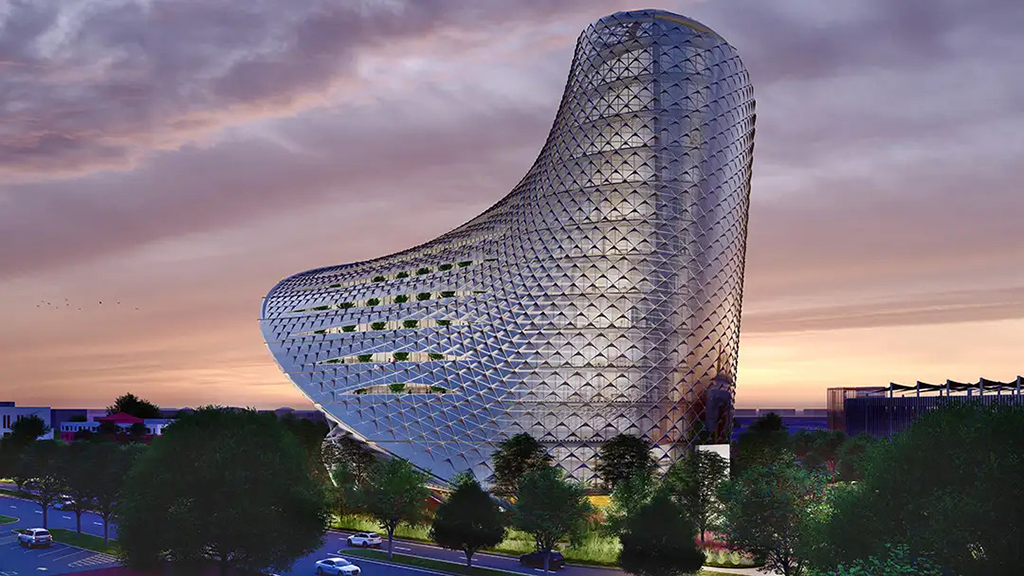A spectacular 11-storey office tower will form the focal point of a 2.5 acre open-community plaza in San Antonio’s Tech Port district southwest of downtown. The building will make a statement about how the city sees its future as a regional high-tech development hub.
The suitably named Innovation Tower was designed by Pelli Clarke and Partners, an international design practice headquartered in New Haven, Conn. and New York City. First unveiled in 2022 as a trapezoidal building with square sides, its shape is now envisioned as a wing-shaped structure.
While the building’s promotion describes Innovation Tower as, “leading the evolution of the office environment to attract, inspire and retain top talent,” it stands as an expensive space to lease.
Depending on the amount of space, finishes and lease terms, rents would be $50 per square foot and possibly higher, more than San Antonio’s flashiest downtown office buildings.
Tenants can choose floorplate areas from 10,800 to over 20,000 square feet. Spaces can be customized to include commercial kitchens and knock-out slab walls for connecting stairs. All spaces have floor-to-ceiling glass walls and at least 10-foot ceilings, with some open ceiling heights of 14 feet.
Tenant employees will have access to a selection of amenities spanning 27,000 square feet. These include a 7,300-square-foot health and wellness center, 540-square-foot premium fitness room, spa, a 3,400-square-foot dining terrace and a multi-purpose amphitheater.
Construction of the building, designed to LEED Gold standard, will be funded with debt and the port’s own capital. While construction is projected to take four years beginning in early 2025, pre-leasing has already begun.
Innovation Tower will play a key part in the continuing development of Tech Port’s 800 remaining acres.
The district was created as a result of the closure of Kelly Air Force Base ordered in 1995 and finalized in 2001. This was an economic setback for the city of San Antonio. However, the city created a non-profit port authority to own, operate and redevelop half of the 4,000-acre property.
Approximately 750,000 square feet of facilities have been built since 2017. The largest single project to date is the $70-million, 130,000-square-foot esports and concert venue known as the Boeing Center at Tech Port.“Our 1,900-acre Tech Port campus just southwest of downtown San Antonio is home to leading global industries: aerospace, defense, global logistics, manufacturing, cybersecurity, education and much more,” Tech Port’s website proudly states.
“Enterprises based here are connecting with one another as they deliver technological innovations that are transforming mature industry sectors in our region, across the country and around the world.”
In fact, Tech Port has attracted a growing number of locally headquartered start-ups in advanced technologies such as aerospace, cybersecurity, defense, space exploration and robotics. Today, over 80 tenant customers employ 18,000 people, generating over $5 billion in annual economic activity to the region.
More expansion has been proposed.
Just a few miles away on the former Kelly Air Force Base site, Tech Port has proposed a $1 to $1.4 billion base as a new headquarters for the 16th Air Force, known as Air Forces Cyber. That’s the armed service’s lead organization for information warfare, including intelligence, surveillance, reconnaissance, cyber operations and electromagnetic warfare.
The proposed complex would see the highly classified work done by Air Force Cyber move to the port from older buildings on Joint Base San Antonio-Lackland (JBSA).
Tech Port’s sales pitch to the Pentagon is founded on the conviction that current facilities are far from ideal for an organization that is “focused on helping safeguard America across the information domain.”
“The Pentagon has many aging and decrepit facilities across JBSA and around the world,” said Jim Perschbach, Port San Antonio president and CEO. “But despite vast defense budgets, the services face major bureaucratic hurdles on new facilities, a fact that could boost acceptance of the port’s unique proposal.”
Perschbach has suggested Tech Port’s approach could have Air Force Cyber relocated into its new home in about half the time and at a savings of over $1 billion versus alternative proposals.
“Such agreements haven’t previously been used for major infrastructure investments, but the novel approach is gaining traction with both state and federal officials because it could yield results more quickly than the traditional military construction process.”
If successful, the new Air Forces Cyber base together with the Innovation Tower would clearly mark San Antonio’s Tech Port for even more innovation growth in the future.



Recent Comments